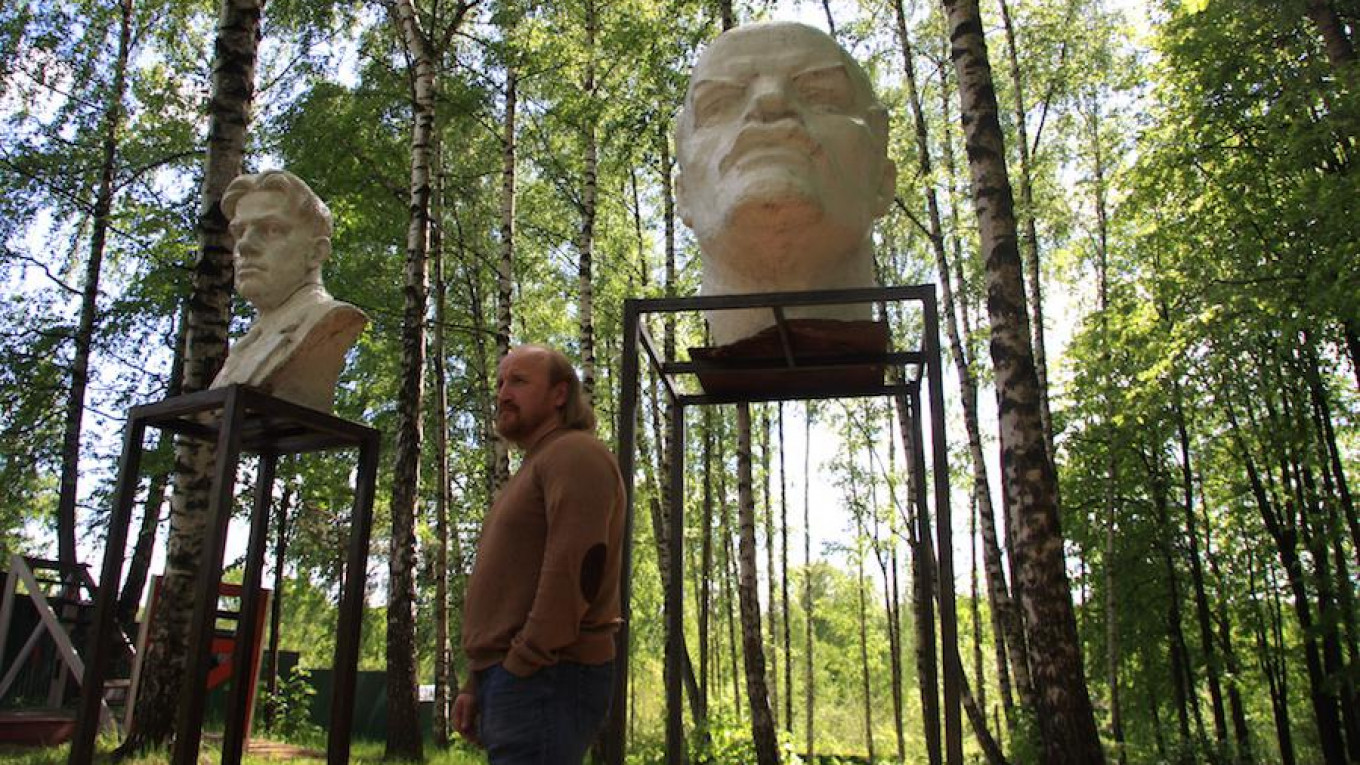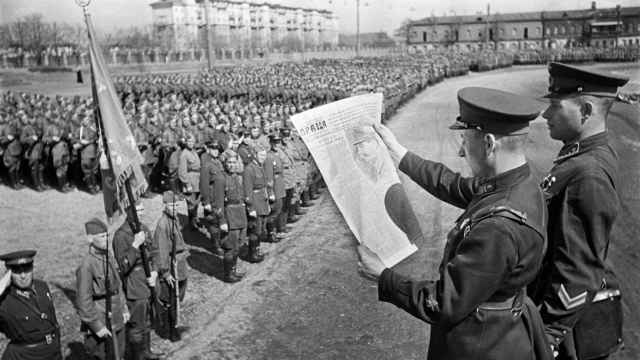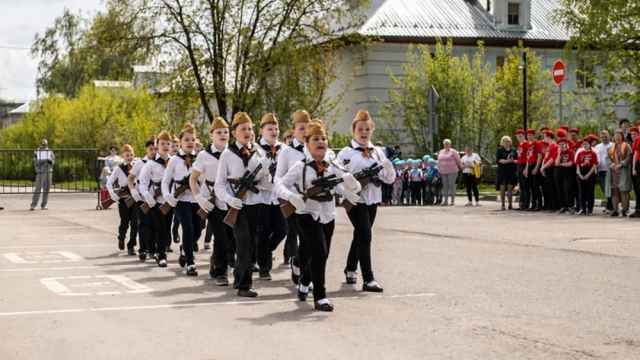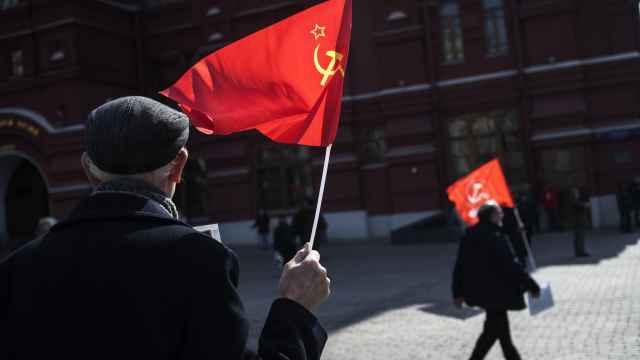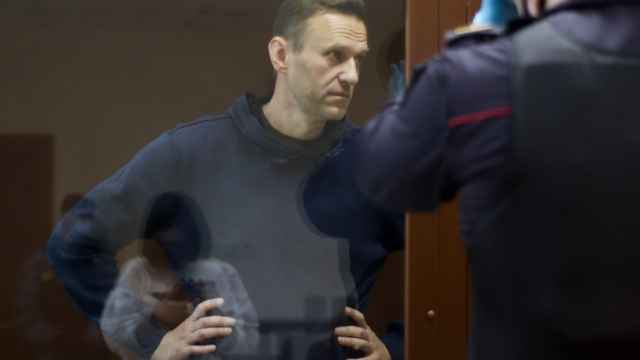At first glance, Andrei Dudarev is an ordinary Orthodox priest working at an ordinary church in an ordinary commuter town outside Moscow.
But the 42-year old cleric has unusual and, for the Church, controversial, passions in the literary field. He suspects his activities to promote his favorite writers have ultimately earned him dismissal from his parish priest post.
Above all, Dudarev is a fan of the fiercely revolutionary Mayakovsky, who penned anti-religious poems and committed suicide in 1930.
He has not only arranged for a bust of Mayakovsky to be put up in Pushkino, the town where he grew up and now works but has opened a museum to the controversial poet who he maintains actually died in a bizarre accident.
Dudarev sees no contradiction between his position as a priest and his love for Mayakovsky.
On many points, there is even “absolute harmony between Christianity, the Gospels, the New Testament and the work of Mayakovsky,” he says. “Mayakovsky’s work and Mayakovsky’s personality have a lot of potential to help the people around me develop. That’s why I do it.”
A new museum
Dudarev’s flagship project is a museum on the site of the country house that Mayakovsky frequented in the 1920s.
The original building became a trash dump when it burnt to the ground on the 100th anniversary of the poet’s birth in 1993—in a fire Dudarev says was arson. The new wooden building, which is a copy of its predecessor, was opened in 2014. It sits amid birch trees and a garden that features larger-than-life busts of Mayakovsky and Vladimir Lenin.
Inside, the museum is whitewashed and there are no written displays. One of the walls is covered with copies of early Soviet propaganda posters. The museum was not designed to give visitors a series of facts about Mayakovsky, but to help them examine their own lives, according to Dudarev.
“For happiness, a person needs to know himself,” he told The Moscow Times. “Get to know yourself. Who are you? In one place, we are one person. At home, we’re another person. In another place, we are a third type of person. Where is the real you? Who’s the real you?”
Persona non-grata
But Mayakovsky is not Dudarev’s only literary interest. He has also designed a statue, now standing in the town, of author Leo Tolstoy, who was highly critical of the Orthodox Church and excommunicated nine years before his death.
His other public works include arranging for a World War II tank to be installed in a newly landscaped site in the center of Pushkino to “help people understand the facts” of the conflict. He is hoping to add a fighter plane later this year.
Dudarev says his projects are embarrassing for the cash-strapped local government and the Orthodox Church. “When people see activity in their backyard they are, of course, unhappy because this activity makes their passivity look bad.”
In October, he was dismissed as the head of Pushkino parish after 18 years for allowing church buildings to be constructed too close to nearby gas pipelines. “That was the formal reason,” he says. “But I fear that there was an informal reason: I am a difficult person to have around.”
In 2012, Dudarev was filmed angrily responding to activists in Moscow who glued a large sticker to the windscreen of a Mercedes he had parked illegally. He says the Mercedes was hired and the footage of the incident was misleadingly edited.
On Dudarev’s request, the Mayakovsky museum and the monuments he installed in Pushkino were transferred to state ownership. But he says officials remain “wary” of him and his friends who donated around 50 million rubles ($877,000) to fund the projects.
Mainstream Orthodoxy is encapsulated by the saying: ‘the more you sleep the less you sin.'
While he says he has no interest in replacing those in positions of religious or secular power, Dudarev is unafraid to criticize the Orthodox Church, which has seen a resurgence of its power and influence under President Vladimir Putin.
“In general people are frightened,” he says. “Mainstream Orthodoxy is encapsulated by [the saying]: ‘the more you sleep the less you sin.’”
Like many religious dissidents, Dudarev urges believers to go back and read original texts. “You can say a lot about [poet Sergei] Yesenin or Mayakovsky but the truth only begins when you start to read their poetry,” he says. “It’s the same with Christianity. Let’s read the sources.”
He can recite the poems of his favorite authors for hours and he has written two books about Yesenin, a prominent lyrical poet who killed himself in 1925.
What’s more, he says standard Russian translations of the Gospels are unsatisfactory.
“It’s not a coincidence that there is a book at the center of the temple. A book is not something that you should kiss, but something to be opened and read,” he says. “And that means you have to think.”
A Message from The Moscow Times:
Dear readers,
We are facing unprecedented challenges. Russia's Prosecutor General's Office has designated The Moscow Times as an "undesirable" organization, criminalizing our work and putting our staff at risk of prosecution. This follows our earlier unjust labeling as a "foreign agent."
These actions are direct attempts to silence independent journalism in Russia. The authorities claim our work "discredits the decisions of the Russian leadership." We see things differently: we strive to provide accurate, unbiased reporting on Russia.
We, the journalists of The Moscow Times, refuse to be silenced. But to continue our work, we need your help.
Your support, no matter how small, makes a world of difference. If you can, please support us monthly starting from just $2. It's quick to set up, and every contribution makes a significant impact.
By supporting The Moscow Times, you're defending open, independent journalism in the face of repression. Thank you for standing with us.
Remind me later.



